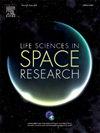Oxidative stress, neuroinflammation, and the blood-brain barrier biomarkers on the brain response to spaceflight
IF 2.8
3区 生物学
Q2 ASTRONOMY & ASTROPHYSICS
引用次数: 0
Abstract
Prolonged spaceflight can induce physiologic and pathologic abnormalities in the central nervous system (CNS). Our knowledge of the adaptive and/or detrimental effects of spaceflight on the structure and function of the nervous system is limited. Substantial effort has been devoted to identifying and developing reliable indicators to characterize and predict CNS injury and dysfunction associated with prolonged exposure to major components of the space environment including microgravity, physiological/psychological stress, and radiation from galactic cosmic rays (GCR) and solar particle events (SPEs) outside of low earth orbit (LEO). The blood-brain barrier (BBB) is a semi-permeable membrane that is essential to maintain homeostasis of the brain microenvironment. Oxidative stress or other environmental stressors may disrupt BBB integrity and increase permeability leading to immune cell infiltration and undesirable neuroinflammation. The focus of this review article is on BBB damage associated with spaceflight and space radiation in rodent and human studies. We will highlight potential biomarkers for this damage, including site-specific and circulating neuroinflammatory factors, BBB structural and brain parenchyma proteins, and neuroimaging tools for BBB damage evaluation. These knowledge will help to understand the risks associated with space travel and are also critical for novel countermeasure development to mitigate the space flight risk to astronaut performances.
氧化应激、神经炎症和血脑屏障生物标志物对太空飞行大脑反应的影响
长时间的太空飞行会诱发中枢神经系统(CNS)的生理和病理异常。我们对太空飞行对神经系统结构和功能的适应性和/或有害影响的了解还很有限。为了确定和开发可靠的指标,以描述和预测与长期暴露于太空环境主要成分(包括微重力、生理/心理压力、银河宇宙射线(GCR)辐射和低地球轨道(LEO)外太阳粒子事件(SPEs))相关的中枢神经系统损伤和功能障碍,我们付出了巨大的努力。血脑屏障(BBB)是一层半透膜,对维持大脑微环境的平衡至关重要。氧化应激或其他环境应激因素可能会破坏血脑屏障的完整性并增加其渗透性,从而导致免疫细胞浸润和不良的神经炎症。这篇综述文章的重点是啮齿动物和人体研究中与太空飞行和太空辐射相关的 BBB 损伤。我们将重点介绍这种损伤的潜在生物标志物,包括特定部位和循环神经炎症因子、BBB 结构和脑实质蛋白,以及用于评估 BBB 损伤的神经影像学工具。这些知识将有助于了解与太空旅行相关的风险,对于开发新型对策以降低太空飞行对宇航员性能的风险也至关重要。
本文章由计算机程序翻译,如有差异,请以英文原文为准。
求助全文
约1分钟内获得全文
求助全文
来源期刊

Life Sciences in Space Research
Agricultural and Biological Sciences-Agricultural and Biological Sciences (miscellaneous)
CiteScore
5.30
自引率
8.00%
发文量
69
期刊介绍:
Life Sciences in Space Research publishes high quality original research and review articles in areas previously covered by the Life Sciences section of COSPAR''s other society journal Advances in Space Research.
Life Sciences in Space Research features an editorial team of top scientists in the space radiation field and guarantees a fast turnaround time from submission to editorial decision.
 求助内容:
求助内容: 应助结果提醒方式:
应助结果提醒方式:


